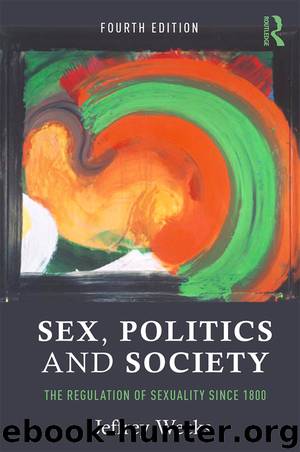Sex, Politics and Society by Weeks Jeffrey;

Author:Weeks, Jeffrey;
Language: eng
Format: epub
Publisher: Routledge
Published: 2017-07-18T16:00:00+00:00
p.189
Although an active supporter of feminism and a popular speaker (and organiser) for socialism from the 1880s, it was only in the 1890s as a result of both personal and political changes that he brought together these concerns with a discussion of directly sexual matters.
In 1894 the Manchester Labour Press published an essay by Carpenter on Homogenic Love and its Place in a Free Society. By 1895 he had prepared a large-scale work entitled Love’s Coming of Age, which covered the range of problems in the relationship between the sexes, but had deliberately omitted the chapter on ‘Homogenic Love’. Nevertheless, as its author he was immediately caught up in the aftermath of the Oscar Wilde affair. Carpenter’s publisher, T. Fisher Unwin, withdrew from publication of the book, and Carpenter reported a panic concerning homosexuality in London: ‘the “boycott” has set in already. Isn’t it a country’.60 The Labour Press stepped into the breach, so gaining the credit for publishing one of the major radical tracts on sexuality of the late nineteenth century. This was followed by a number of related works, chiefly on homosexual themes, including The Intermediate Sex, an expansion of that earlier essay, in 1908.61
What distinguished Carpenter from most of his contemporaries was his willingness to separate sex from procreation, and this had important implications for women as well as homosexuals. He argued in Love’s Coming of Age that public opinion had been largely influenced ‘by the arbitrary notion that the function of love is limited to child bearing; and that any love not concerned in the propagation of the race must necessarily be of dubious character’.62 Against this, Carpenter stressed the pleasurable nature of sex and its function as a binding fact in social relations; its prime object, as he put it, was union. And although he was anxious to stress that emotional love could be transmitted into spiritual, he emphasised that the physical must never be forgotten: without it the ‘higher’ things could never be realised. His aim was thus to free love from darkness and shame, and to place sex in the vital heart of the new awareness.
For Carpenter, ‘Uranians’ formed an ‘intermediate sex’ as bearers of the sexual characteristics of one sex and many of the emotional characteristics of the other: he was thus in the same tradition as many German writers, such as Otto Weininger, as well as, to a lesser extent, Ellis. But whereas Ellis spoke of ‘hormones’ and used a scientific framework, Carpenter’s classifications have an almost metaphysical air: ‘Nature . . . in mixing the elements which go to compose each individual, does not always keep her two groups of ingredients – which represent the two sexes – properly apart’.63
Download
This site does not store any files on its server. We only index and link to content provided by other sites. Please contact the content providers to delete copyright contents if any and email us, we'll remove relevant links or contents immediately.
| Civilization & Culture | Expeditions & Discoveries |
| Jewish | Maritime History & Piracy |
| Religious | Slavery & Emancipation |
| Women in History |
Cecilia; Or, Memoirs of an Heiress — Volume 1 by Fanny Burney(31377)
Cecilia; Or, Memoirs of an Heiress — Volume 3 by Fanny Burney(30970)
Cecilia; Or, Memoirs of an Heiress — Volume 2 by Fanny Burney(30924)
The Secret History by Donna Tartt(16725)
Sapiens: A Brief History of Humankind by Yuval Noah Harari(13128)
Leonardo da Vinci by Walter Isaacson(11955)
The Radium Girls by Kate Moore(10946)
Sapiens by Yuval Noah Harari(4584)
How Democracies Die by Steven Levitsky & Daniel Ziblatt(4450)
The Wind in My Hair by Masih Alinejad(4441)
Homo Deus: A Brief History of Tomorrow by Yuval Noah Harari(4307)
Endurance: Shackleton's Incredible Voyage by Alfred Lansing(3877)
The Silk Roads by Peter Frankopan(3813)
Man's Search for Meaning by Viktor Frankl(3677)
Millionaire: The Philanderer, Gambler, and Duelist Who Invented Modern Finance by Janet Gleeson(3599)
The Rape of Nanking by Iris Chang(3549)
Hitler in Los Angeles by Steven J. Ross(3463)
The Motorcycle Diaries by Ernesto Che Guevara(3364)
Joan of Arc by Mary Gordon(3282)
